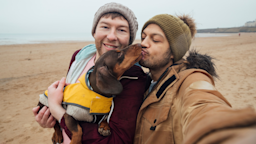Key takeaways:
It’s normal for puppies to chew on things to soothe their gums as they teethe. But they should scale back on chewing after about 8 months of age.
As dogs grow older, they may chew excessively on household items because they’re bored or have separation anxiety.
Giving a dog chew toys and making sure they have plenty of exercise can help curb excessive chewing.
Dogs chew on things for many reasons, including to soothe sore gums and familiarize themselves with items. But excessive chewing can be harmful to your dog and destructive to your property. Fortunately, there are things you can do to manage too much chewing.
Here we’ll review ways to stop a dog from chewing too much, reasons why dogs chew things, and signs that a dog’s chewing may be related to a health issue.
How to stop a dog from chewing everything
Here are 10 tips to stop your dog from chewing on things excessively.
Search and compare options
1. Make sure your dog has enough exercise
A lack of physical exercise can contribute to a dog chewing.
“Dogs need aerobic exercise that increases their heart rate,” said Meredith Hoffman, PhD, an animal behaviorist with Loma Behavior and Training in San Antonio, Texas. “Although walking is a fun activity for many dogs and provides mental enrichment, it doesn’t provide the same physical challenge to dogs as it does to us.”
If your dog is in good health and energetic, try getting them to do the following physical activities:
Running
Diving into water
Playing fetch
2. Do puzzles with your dog
“Sometimes, dogs chew to relieve boredom due to lack of sufficient mental stimulation,” Hoffman said. To avoid this, she recommends activities such as:
Having your dog use their sense of smell to locate treats in a snuffle mat
Giving your dog different food puzzles that require them to solve problems
Teaching your dog new skills, if that’s something they enjoy
3. Dogproof your house
Keep things your dog might be tempted to chew off the floor and other reachable surfaces. Store these items in closets, drawers, cabinets, and plastic bins with snap lids instead. And get baby locks if your dog figures out how to open them.
All bark, no bite: Does your dog bark too much? These tips and tricks can stop your dog from barking excessively.
Is Rex stressed? There are lots of things you can do at home to calm an anxious or hyperactive dog. These strategies should help.
Muzzle dos and don’ts: Muzzles can be helpful tools for dogs if used properly. Learn how to use a muzzle correctly and why you should never use one to punish a dog.
4. Give your dog chew toys
Chew toys can direct your dog’s attention away from items they shouldn’t chew. Just make sure their chew toys don’t look like your children’s playthings if you have kids. Your dog may not be able to distinguish between their toys and your child’s toys.
5. Develop a routine
Build time for playing with chew toys into your dog’s daily routine. This can help them learn when chewing is OK and when it’s not.
6. Create a safe space for them to hang out in
Leave your dog in a designated safe space, like a crate or an enclosed area, when you can’t supervise them. Fill the space with your dog’s favorite chew toys, a water bowl, and their pet bed.
Read more like this
Explore these related articles, suggested for readers like you.
7. Make trades with treats
Don’t remove an item your dog is chewing on from their mouth. Instead, offer them a more appealing item, like one of their chew toys or a food puzzle with treats, as a trade.
8. Reward your dog for making good choices
Reward your dog with praise and affection when they choose a chew toy over something they’re not supposed to chew.
9. Don’t give your dog used household items to play with
Don’t give your dog old items like shoes, socks, or children’s toys. Dogs can’t tell the difference between something old and something new, and they may start chewing on things you don’t want them to as a result. Only give your pet chew toys made for dogs.
10. Talk to a vet about treatment for anxiety
If your dog keeps chewing things around the house, speak to a veterinarian to rule out an underlying health issue, like anxiety. Then, if they get a clean bill of health, consider working with a certified animal behaviorist or professional dog trainer. They can help you figure out what’s causing your dog’s behavior and offer training tips.
Why do dogs chew on things?
Dogs chew on things for a variety of reasons. Common reasons include:
Exploring new things
Easing stress or anxiety
Exercising their jaws
Alleviating boredom
Relieving discomfort while teething
Not being taught what was OK and not OK to chew as puppies
“We must recognize that chewing itself is a normal behavior for dogs and occurs in natural feeding situations,” Hoffman said. “Canids will chew on bones to obtain meat as well as the marrow inside. Our pet dogs do not need to rely on this strategy to get their nutrients because they are fed nutritionally balanced pet food. But this doesn’t stop dogs from having a drive or desire to chew.”
Do dogs outgrow chewing?
Chewing up household items is most often associated with teething puppies. Teething lasts until dogs are about 8 months old. And during that time, puppies need guidance if they chew destructively.
“Sometimes, puppies that are not directed to the appropriate objects for chewing can grow up to not have a good understanding of which objects are for chewing and which ones aren’t,” Hoffman said.
If an adult dog chews excessively and becomes destructive, it could also mean something else is going on, like a phobia or separation anxiety.
How can you tell if your dog’s chewing is because of a health issue?
A dog may chew on things because they have an underlying health condition or behavioral issue. Health issues that may cause excessive chewing include:
Pica (compulsively eating nonfood items)
Irritation in the digestive tract
Excessive hunger
Gum disease
Can a professional trainer help stop a dog from chewing?
Yes, a skilled professional trainer can help stop a dog from destructive chewing. According to Paul Loré, a master dog trainer with Integrated K9 Solutions in Georgia, a professional trainer will typically explore the following questions with the owner of a dog who is chewing too much.
Is your dog getting enough exercise?
Dogs with excess pep may chew on things to work out their energy. “We want to make sure the dog has a proper outlet for their energy level,” Loré said.
Does your dog follow basic obedience commands?
“Here, we want to see if the dog is good with commands both inside the home and in outside environments,” Loré said. “A dog with a higher level of obedience would know the ‘out’ and ‘leave it’ commands.”
How is your relationship with your dog?
“A dog needs a healthy, emotional connection with their human and to understand their place in the hierarchy within the family,” Loré said. “A dog needs consistent leadership from their owner.”
Is your dog anxious and, if so, why?
Some dogs chew things because of “pent-up anxious energy,” which can be caused by a variety of things, Loré points out.
“Some dog breeds are genetically born with anxiety,” he said. “But some dogs live in a home that may cause them stress, like a home where there’s a lot of yelling or a lot of people coming and going.”
Is your dog getting proper signals?
“Pet owners have to be consistent and clear with their communication of what’s allowed and not allowed,” Loré said. With proper signals, a dog owner can communicate to their pet when to drop an item or where to find an appropriate chew toy.
Frequently asked questions
Yes, younger dogs are more likely to chew things that they shouldn’t. They may chew to soothe sore gums as new teeth come in or to explore new things.
Dental chews, as well as chew toys, can help curb excessive chewing behaviors in dogs. They give dogs something to chew on that’s appropriate.
Many puppies stop destructive chewing at about 8 months, when they’re no longer teething. But other puppies continue chewing excessively into adulthood. This can be a sign that something else is going on, like separation anxiety or boredom.
Yes, younger dogs are more likely to chew things that they shouldn’t. They may chew to soothe sore gums as new teeth come in or to explore new things.
Dental chews, as well as chew toys, can help curb excessive chewing behaviors in dogs. They give dogs something to chew on that’s appropriate.
Many puppies stop destructive chewing at about 8 months, when they’re no longer teething. But other puppies continue chewing excessively into adulthood. This can be a sign that something else is going on, like separation anxiety or boredom.
The bottom line
Puppies and adult dogs like to chew on things. It’s a normal behavior that starts at a young age because of teething and may continue for a dog’s lifetime. But destructive chewing can be a problem for pet owners.
Your dog may chew on things they shouldn’t because they’re bored, anxious, or have an underlying health issue. You can try managing your dog’s behavior by giving them regular exercise, dogproofing your home, and providing them with chew toys. But if excessive chewing continues, take your dog to a vet or a professional dog trainer.

Why trust our experts?



References
American Society for the Prevention of Cruelty to Animals. (n.d.). Destructive chewing.
Humane Society of Western Montana. (n.d.) Destructive chewing.
Landsberg, G. M., et al. (2014). Behavioral problems of dogs. Merck Veterinary Manual.
Lundgren, B., et al. (2019). Destructive chewing by puppies and dogs. Veterinary Partner.
Massachusetts Society for the Prevention of Cruelty to Animals - Angell Animal Medical Center. (n.d.). Explaining destructive behavior in dogs.
The Humane Society of the United States. (n.d.). How to stop your dog's chewing and biting problem.


















